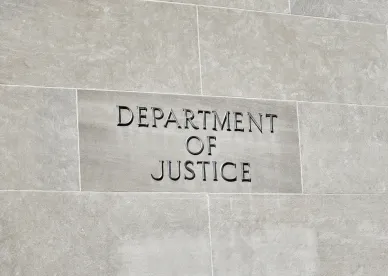The outcome of the 2020 general election in the United States will determine which of two visions of the investigative and prosecutorial arms of the federal executive branch will prevail for 2021 and beyond. The campaigns and associates of the two major party candidates for president — incumbent President Donald Trump and former Vice President Joe Biden — have forecast starkly different views of how each would use the powers of the U.S. Department of Justice (DOJ) should he be elected to serve the 2021-24 presidential term.
In Vice President Biden’s case, his campaign messaging includes explicit descriptions of his intended direction for the DOJ. In President Trump’s case, there is no better preview of his second-term DOJ than the words of the man he has tapped to lead the department as the U.S. attorney general since February 14, 2019, William Barr.
Biden’s First-Term Department of Justice
Vice President Biden’s written campaign materials focus on preventing government misconduct and eliminating a perceived partisan influence over the DOJ. Under a Biden presidency, businesses can also expect to see an increase in prosecutions for environmental protection violations, and an effort to prosecute companies and executives tied to the opioid crisis.
Impact on Businesses That Interact With Government Agencies
If elected, Biden’s campaign materials state that its DOJ would prioritize integrity of the department and other executive branch agencies by investigating, prosecuting and preventing government-related misconduct. Businesses that work with federal agencies, whether as a contractor, grantee, permittee or otherwise, would be advised to refresh compliance materials and training.
In what may appear to be a super inspector general entity, Biden has also pledged to combat government misconduct by creating a new government agency with the purpose of overseeing and enforcing federal anti-corruption and ethics laws. The proposed agency would have the power to refer matters to the DOJ for criminal investigation.
DOJ Integrity and Public Perception
A centerpiece of Biden’s agenda is to guard DOJ investigations and prosecutions from undue partisan influence. Biden has several policy proposals that address this, including a proposed executive order directing that no member of his administration may obstruct or unduly influence a DOJ investigation for any reason.
To ensure continuity and transparency regarding the DOJ’s position on significant legal issues, Biden has proposed revising DOJ policies and practices so that the DOJ would be required to report and explain any change in position it has on any “significant legal issue” to Congress and the public.
Biden also supports legislation that would grant the DOJ Inspector General (IG) the power to investigate allegations of improper partisan influence over DOJ investigations and prosecutions, and a requirement that the IG report any such allegations to Congress. Biden has promised to strengthen IG laws to give agency IGs full subpoena power to investigate misconduct. Although IG investigations typically do not carry the same criminal sanctions as regular DOJ investigations, their scope may be broader and limitations more relaxed.
Increased Whistleblower Protections
Under a Biden DOJ, an increase in whistleblower-driven prosecutions is also likely. Biden has made a commitment to strengthen whistleblower laws to protect employees who report misconduct. This could have a significant impact on employers who receive federal grants or contract with federal agencies, who may be subject to increased claims involving whistleblower retaliation.
Increased Environmental Enforcement
A second priority for a Biden-led DOJ would be increased environmental protection enforcement. Biden has promised to create a new environmental protection division within the DOJ — the Environmental and Climate Justice Division — which would complement the existing Environment and Natural Resources Division.
Biden would increase enforcement of antipollution laws by directing the DOJ and the Environmental Protection Agency (EPA) to pursue criminal antipollution cases “to the fullest extent of the law.” Biden has also proposed additional legislation to hold corporate executives personally accountable for antipollution violations, which may include prison time for certain offenses.
The new attorney general would also be instructed to increase enforcement of environmental laws, support plaintiff-driven climate change litigation against polluters, address “legacy pollution” and work with the EPA’s Office of Civil Rights.
If elected, Biden would implement, to the extent possible by executive action, Sen. Cory Booker’s Environmental Justice Act of 2019. The aim of Booker’s act is to address “the environmental injustices that harm communities of color, low-income communities, and indigenous communities around the country.” The act seeks to address these policy goals by, among other things, directing federal agencies to address the environmental impact of federal actions on minority and low-income communities, requiring federal agencies to address environmental justice, and creating a private right of action and statutory damages for certain citizens who are harmed by environmental misconduct.
Response to the Opioid Crisis
Last, a major focus of the Biden campaign is the opioid crisis. As part of his plan to tackle the issue, Biden would make the investigation and prosecution of pharmaceutical companies, executives and others who the administration believes may have played a role in the opioid crisis a top priority.
Trump’s Second-Term Department of Justice
In a recent address at Hillsdale College, Attorney General William Barr outlined many facets of his prosecutorial philosophy and his understanding of the powers of the federal executive in criminal justice, both of which would inform the conduct of a possible second-term Trump DOJ.
Completely contrary to Biden’s principal goal of rooting out partisanship from DOJ prosecutorial decision-making, Barr’s speech revealed his belief that the “most basic check on prosecutorial power is politics.” Barr embraced the DOJ as a political and partisan entity. Barr argued that because the DOJ’s leadership is appointed by the president and confirmed by the members of the Senate, all of whom are elected representatives of the people, political and partisan considerations are entirely appropriate.
Based on this premise — that DOJ decision-making is inherently political — Barr deemed line DOJ prosecutors throughout the country as “part of the permanent bureaucracy” who lack “political legitimacy” to make prosecution decisions that are unchecked by their partisan leadership. In Barr’s view, prosecutorial discretion ultimately should and must always be held and exercised by the political — not merely the bureaucratic — parts of the DOJ. “But” — Barr qualified — “they are political in a good and necessary sense.”
Put another way, in Trump’s DOJ, the influence of politics on charging or declination decisions are a feature, not a bug. According to Barr, top-level political supervisors within the DOJ — the attorney general, U.S. attorneys, and other senior DOJ officials appointed and removable by the president — must be able to intervene in any prosecution they see fit in any part of the country. This ability to intervene is the only way to ensure consistency of charging decisions and fairness to defendants. If the political supervisors fail to intervene in charging recommendations or decisions of the bureaucratic line prosecutors, the political officials have “abdicat[ed]” their duties in Barr’s view. Barr set out his principle by analogy: “Letting the most junior members set the agenda might be a good philosophy for a Montessori preschool, but it’s no way to run a federal agency.”
Barr identified several contemporary trends to support his belief that the DOJ’s political supervisors should not defer to line prosecutors.
-
First, he noted that line prosecutors become — perhaps unwittingly — emotionally captivated by and possessive of their investigations. This may give rise to the “temptation to will a prosecution into existence” even if the facts or the law do not actually support bringing charges. DOJ supervisors must hold line prosecutors accountable to objective charging decisions.
-
Second, he decried the DOJ’s increased tendency to interpret statutes and make charging decisions based on “hyper-aggressive extensions of the criminal law.” As Barr summarized his concern, “if criminal statutes are endlessly manipulable then everything becomes a potential crime.” He stated that the DOJ must cease wrongful and aggressive interpretation of statutes to support charging decisions.
-
Third, he decried line prosecutors’ “criminalization of politics,” by which “ambitious lawyers [seek] to amass glory by prosecuting prominent public figures.” He vowed to put an end to these kinds of prosecutions.
In sum, a Trump second-term DOJ, unlike a potential Biden DOJ, will pull back from giving line prosecutors discretion in their charging decisions and give political appointees greater latitude to overrule line prosecutors’ charging recommendations. This shift in authority, discretion and supervision could open additional avenues of appeal to political supervisors. If targets or defendants identify circumstances like those described by Barr — e.g., the line prosecutor is “attached” to their case and lacks objectivity or is wrongly interpreting a statute to prohibit what is actually noncriminal conduct — they may more readily seek the intervention of their politically appointed supervisor.
Barr and other political appointees within the DOJ will have greater discretion and a loosened standard of review in overriding the charging decisions of overzealous line prosecutors if the target or defendant can make a persuasive case to a politically appointed supervisor that the supervisor should perform their duty by reining in the line prosecutor under the three points identified by Attorney General Barr.




 />i
/>i
